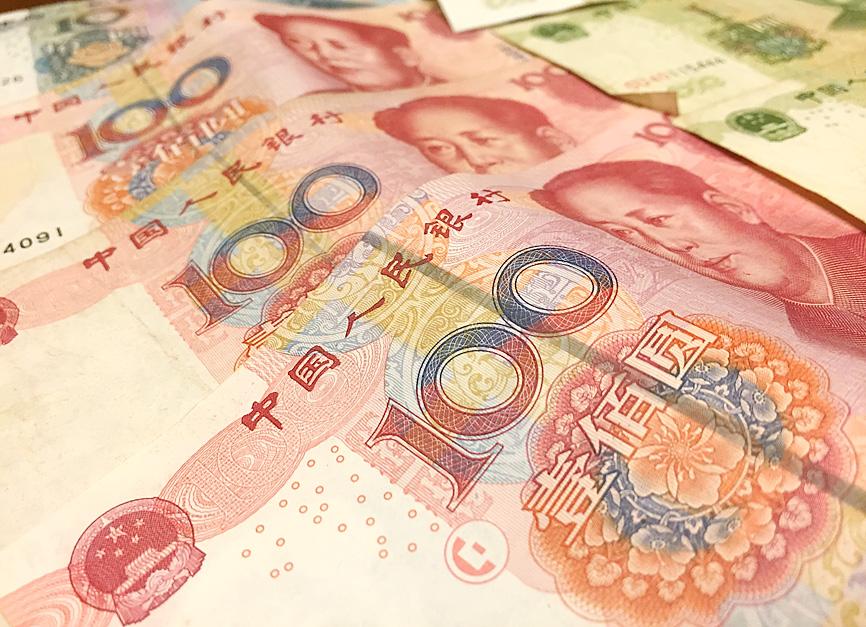Yuan deposits held by local banks last month increased by 1.34 percent to 241.24 billion yuan (US$37.23 billion), ending three months of decline, after corporate investors raised holdings, but individuals trimmed positions, the central bank said on Thursday.
Yuan deposits increased by 1.23 percent to 208.84 billion yuan at domestic banking units, while climbing by 2.03 percent to 32.39 billion yuan at offshore banking units, central bank Department of Foreign Exchange Deputy Director-General Gloria Chen (陳婉寧) told an online news conference in Taipei.
Chen attributed the advance at domestic units to bond redemptions by local insurance companies and the increase at offshore units to account receivables by local electronics firms.

Photo: Kelson Wang, Taipei Times
Five yuan-denominated bonds were each worth 4.95 billion yuan or more last month, while two new bonds entered the market, raising 3.85 billion yuan, Chen said.
However, retail investors continued to cut yuan deposits in favor of new yuan funds that promise higher yields, she said.
The People’s Bank of China last week announced that it would lower reserve requirement ratios by 0.5 percentage points, which is believed to inject 1 trillion yuan into the financial system to help support China’s economic growth, but might bode ill for investors reliant on interest incomes.
Bank of China Ltd’s (中國銀行) Taipei branch lowered interest rates for deposits of several tenures by 0.1 to 0.27 percentage points.
Bank SinoPac (永豐銀行) is offering the highest interest rate among its peers of 3.05 percent for one-month yuan deposits, while the Bank of Kaohsiung (高雄銀行) has the highest interest rate of 1.65 percent for three-month yuan deposits, Chen said.

Taiwan Semiconductor Manufacturing Co (TSMC, 台積電) yesterday said that its investment plan in Arizona is going according to schedule, following a local media report claiming that the company is planning to break ground on its third wafer fab in the US in June. In a statement, TSMC said it does not comment on market speculation, but that its investments in Arizona are proceeding well. TSMC is investing more than US$65 billion in Arizona to build three advanced wafer fabs. The first one has started production using the 4-nanometer (nm) process, while the second one would start mass production using the

A TAIWAN DEAL: TSMC is in early talks to fully operate Intel’s US semiconductor factories in a deal first raised by Trump officials, but Intel’s interest is uncertain Broadcom Inc has had informal talks with its advisers about making a bid for Intel Corp’s chip-design and marketing business, the Wall Street Journal reported, citing people familiar with the matter. Nothing has been submitted to Intel and Broadcom could decide not to pursue a deal, according to the Journal. Bloomberg News earlier reported that Taiwan Semiconductor Manufacturing Co (TSMC, 台積電) is in early talks for a controlling stake in Intel’s factories at the request of officials at US President Donald Trump’s administration, as the president looks to boost US manufacturing and maintain the country’s leadership in critical technologies. Trump officials raised the

‘SILVER LINING’: Although the news caused TSMC to fall on the local market, an analyst said that as tariffs are not set to go into effect until April, there is still time for negotiations US President Donald Trump on Tuesday said that he would likely impose tariffs on semiconductor, automobile and pharmaceutical imports of about 25 percent, with an announcement coming as soon as April 2 in a move that would represent a dramatic widening of the US leader’s trade war. “I probably will tell you that on April 2, but it’ll be in the neighborhood of 25 percent,” Trump told reporters at his Mar-a-Lago club when asked about his plan for auto tariffs. Asked about similar levies on pharmaceutical drugs and semiconductors, the president said that “it’ll be 25 percent and higher, and it’ll

CHIP BOOM: Revenue for the semiconductor industry is set to reach US$1 trillion by 2032, opening up opportunities for the chip pacakging and testing company, it said ASE Technology Holding Co (日月光投控), the world’s largest provider of outsourced semiconductor assembly and test (OSAT) services, yesterday launched a new advanced manufacturing facility in Penang, Malaysia, aiming to meet growing demand for emerging technologies such as generative artificial intelligence (AI) applications. The US$300 million facility is a critical step in expanding ASE’s global footprint, offering an alternative for customers from the US, Europe, Japan, South Korea and China to assemble and test chips outside of Taiwan amid efforts to diversify supply chains. The plant, the company’s fifth in Malaysia, is part of a strategic expansion plan that would more than triple